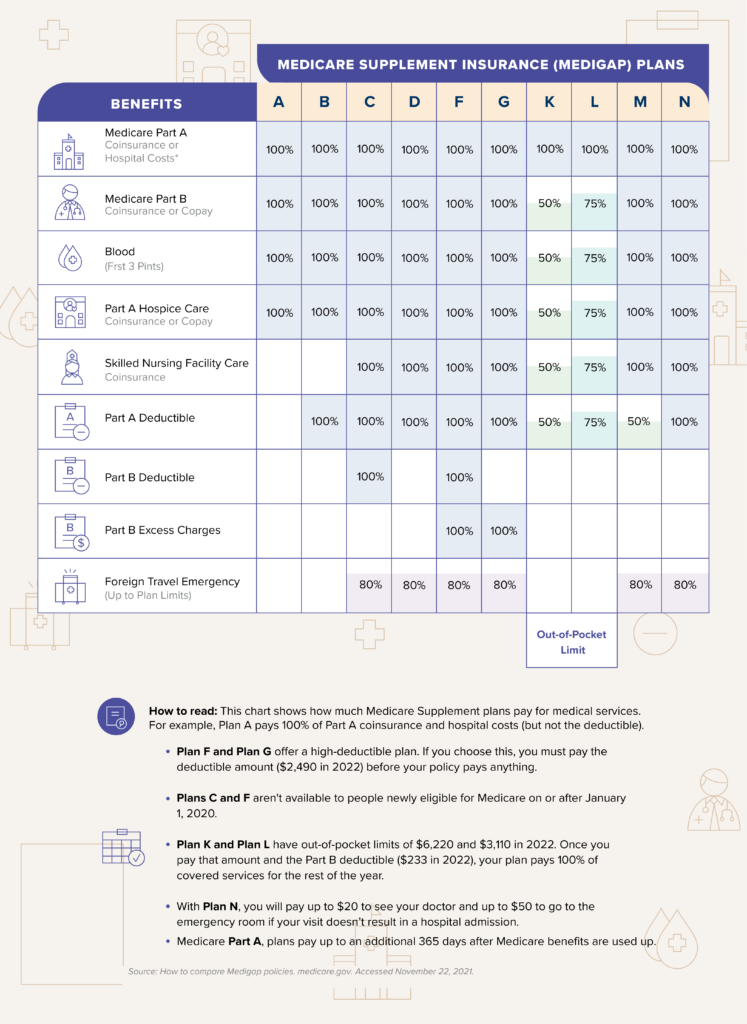District of Columbia (D.C.) Medicare supplement plans (also known as Medigap policies) help pay for healthcare costs that Medicare doesn’t cover. Original Medicare has deductibles, copayments, and coinsurance, so you face significant out-of-pocket costs if you don’t have other coverage. Medicare Supplement plans pay many of those costs.
What Are Medicare Supplement Plans in the District of Columbia?
Medicare-approved private insurance companies sell these plans. They are standardized by letter, so Plan A has the same benefits regardless of which insurance company you purchase it from.1
What You Need to Know
The best time to enroll in a plan is during your Medigap Open Enrollment Period.
The most popular Medicare Supplement plans are Plans F, G and N.
D.C. plan prices vary depending on your age and gender.
When Can You Enroll in a Medigap Policy?
Medicare beneficiaries can enroll in a D.C. Medicare Supplement plan at any time. However, the best time to enroll is during your Medigap Open Enrollment Period. This period is six months long and begins the month you are both age 65 (or older) and enrolled in Medicare Part B.
During this period, insurance companies are required to sell you a Medigap policy, and they can’t charge you more due to any health conditions you may have.
Outside of your Medigap Open Enrollment Period, you can apply for coverage, but insurance companies can deny your application or charge you more due to your health.2 The exception is if you have what are called guaranteed issue rights. When you have these rights, insurance companies must sell you a Medicare Supplement plan, and you can’t be charged more due to health issues.
Several situations entitle you to guaranteed issue rights, including:
- Moving out of a Medicare Advantage (MA) plan’s service area.
- Having Original Medicare and an employer plan, and the employer plan is ending.
- Joining a Medicare Advantage plan when you were first eligible for Medicare Part A and within the first year of joining, you decide to switch back to Original Medicare.
- Dropping a Medigap policy to join an MA plan and deciding within the first year of having the MA plan that you want to switch back to your Medicare Supplement plan.
- Your Medicare Supplement insurance company goes bankrupt.
- Your Medigap insurance company misled you.3
If you’re on Medicare because of a disability or end-stage renal disease (ESRD) and younger than age 65, you might not be able to purchase a Medicare Supplement plan until you turn 65.4
Understand Plan Pricing
Ask insurers how they price their plans so you will know if the cost will rise as you get older.
What Are the Most Popular Medicare Supplement Plans?
| Plan Type | Total Enrolled (Rounded) | Percent of Total Enrolled |
| Plan F | 7,000 | 63% |
| Plan G | 1,000 | 10% |
| Plan N | 1,000 | 9% |
The most popular Medicare Supplement plan is Plan F. More than 60% of people with a Medigap policy have Plan F because it offers the most coverage, including:
- Medicare Part A coinsurance, which goes toward hospital costs.
- Medicare Part B coinsurance and copayments.
- The first three pints of blood.
- Medicare Part A hospice care coinsurance or copayments.
- Skilled nursing facility care coinsurance.
- Medicare Part A and Medicare Part B deductibles.
- 80% of foreign travel emergency costs, up to plan limits.
Plan F also covers Medicare Part B excess charges. Doctors who don’t accept Medicare assignments can charge up to 15% more than the Medicare-approved amount for services.5 Plan F covers these costs.
Plan F is no longer for sale to Medicare enrollees who started Medicare on or after January 1, 2020. If you started Medicare before that, you may be able to buy Plan F if an insurance company accepts your application or if you have guaranteed issue rights.
Plan G is the second most popular plan. It covers everything Plan F does except for the Medicare Part B deductible. Seventeen percent of those who have a Medicare Supplement plan are enrolled in Plan G.
Plan N is the third most popular plan. This plan covers everything Plan F does except for the Part B deductible and Part B excess charges. Plan N also has copays for certain services. You have a copay of up to $20 for some office visits and up to $50 for an emergency room visit that doesn’t result in a hospital admission.7
Choose the Right Plan for You
Decide which lettered plan provides the coverage you need and contact health insurers in your area of the District of Columbia to find out what the cost is for their plan.
How Do You Choose a Medicare Supplement Plan?
To choose a Medicare Supplement plan, start by deciding which lettered plan(s) you prefer. Next, visit the Medicare Plan Finder to learn which plans are available in D.C. Contact at least a few insurance companies to get prices on your preferred plans.
Even though the plans are standardized, prices vary from company to company. This is because insurance companies can choose how they price their plans. They can use one of the following options:
- Community ratings: With this option, the insurance company charges everyone the same premium, regardless of age or gender.
- Issue age ratings: With this pricing model, the premiums are based on the age when you buy the policy. Premiums may increase due to inflation but not due to age.
- Attained age ratings: With this pricing option, Insurers base the premium on your current age, which means premiums increase as you get older. These plans are often the cheapest when you’re younger and become the most expensive as you age.8
That’s why it’s essential to contact multiple insurance companies and compare policies.
Do Medicare Supplement Plans Offer Prescription Coverage?
Medicare Supplement insurance plans do not offer prescription drug coverage. However, Medicare Part D plans provide this coverage, so consider buying one in addition to a Medigap policy.9
How Much Do Medigap Policies Cost?
Washington, D.C., plan prices vary depending on your age and gender.
65-Year-Old Woman, No Tobacco Use
| Plan Type | Premium Range |
| Plan F | $115-$323 |
| Plan G | $96-$295 |
| Plan N | $76-$257 |
65-Year-Old Man, No Tobacco Use
| Plan Type | Premium Range |
| Plan F | $132-$358 |
| Plan G | $110-$339 |
| Plan N | $87-$295 |
What Companies Sell Medigap in District of Colombia ?
What If You Want to Change Your Medigap Policy?
You can apply for a new Medigap policy at any time. Keep in mind that insurance companies can decline your application or charge you more for health conditions unless you have guaranteed issue rights.
What Are Alternatives to a Medicare Supplement Plan?
Medicare Advantage (MA) plans (also known as Medicare Part C) are a bundled, all-in-one alternative to Original Medicare coverage and Medigap. These plans provide your Medicare Parts A and B benefits and often include Part D prescription coverage. They usually have additional benefits such as vision, hearing and dental care.10
What Are Medicare Resources in the District of Columbia?
Washington, D.C., residents have several Medicare resources.
- State Health Insurance Assistance Program (SHIP): SHIP offers free information on Medicare benefits, assistance with Medicare Supplement plans and counseling. They can also help resolve unpaid medical bills. Call SHIP at 202-727-8370 or email dacl@dc.gov for assistance.
- Department of Insurance, Securities and Banking: This department can assist you if you have a complaint about your Medicare Supplement plan. To file a complaint, call 202-727-8000 or email disbcomplaints@dc.gov.
- Medicaid services: This program offers free and low-cost health insurance to people with limited income and assets. You can apply online or by calling 855-532-5465. If you need help applying for Medicaid, the Department of Aging and Community Living can assist you. Call 202-724-5626 for more information.
Snippet Render Is Present – D3 cannot be loaded in editor mode. Go to preview or publish mode.

Next Steps
Ready to sign up for a Medigap policy? Decide which lettered plan options you prefer, and contact at least two or three insurance companies. Ask which pricing method they use so you know whether your rates will increase with age.
Consider signing up for a Part D prescription plan to help with your drug costs. If you have questions, reach out to one of D.C.’s Medicare resources for help.


